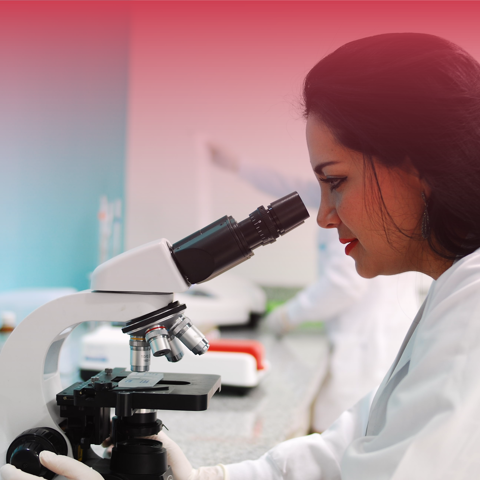
Funded Research
Our Research Funding
Our annual funding round is designed to support bright young researchers, as well as established institutions, as they strive to make the kind of life-changing breakthrough our diabetes community is hoping for.
Our first research award was made in 1999 for a small equipment grant and since that time, we have committed more than £13.5 million to diabetes research in the UK and as part of the International Diabetes Wellness Network, around the world.
To read more about our research strategy, click here.
2017

Pump Priming
Comparison of metabolic coupling and insulin secretion mechanisms in mouse, pig and human islets
- Description - click here to read
-
Diabetes arises from the inability of the beta cells of the islets of Langerhans to secrete adequate amount of insulin to keep blood glucose low. Researchers have focused their attention to understanding the physiology of beta cells in order to identify new pharmacological tools or opportunities for intervention to treat diabetes. Unfortunately only a limited amount of biological islet material of human origin is available for research, thus alternative models to study human physiology are needed and they are represented mainly by islets isolated from other mammals such as mice and pigs. We will compare islets of these three species (human, pig, mouse) to identify what differences exist in terms of the mechanisms that allow increases in glucose to stimulate insulin secretion. We aim to understand what are the best conditions to work with these models in order to be able to fully translate the data obtained with Islets from mice and pigs onto human physiology.
2017

Pump Priming
Development of novel biological inhibitors for ketohexokinase – a target for anti-diabetic drugs
- Description - click here to read
-
The prevalence of diabetes is increasing world-wide. Dietary studies have shown that one of the contributing factors is foods rich in fructose and sucrose, including corn syrup. How fructose increases the risk of diabetes has recently been illuminated by studies in several research laboratories. A protein (enzyme), found primarily in the liver, known as ketohexokinase, is responsible for the breakdown (metabolism) of the dietary fructose and generation of harmful products. Excessive production of these products leads to pathological changes in the body, leading to diabetes. Thus, recent research has led to the idea that blockade of ketohexokinase should help prevent high fructose diet induced diabetes. However, developing a selective small molecule drug against this enzyme is proving difficult, because KHK proteins share structural features found in a number of other important proteins in the human body. Without selectivity, small molecules are likely to cause side effects when used clinically. Here, we aim to develop new, highly specific biological molecules that may prove useful for preventing high fructose induced diabetes.
2017

Pump Priming
Is plasma amyloid a useful biomarker for metabolic syndrome?
Recipient: Professor Michael Ashford
Institution: University of Dundee
City: Dundee
Amount: £19,664
- Description - click here to read
-
The alarming increase in type 2 diabetes is primarily owing to the growing prevalence of obesity and aging. Metabolic syndrome (MetS) is a clustering of cardiovascular disease risk factors, including obesity, diabetes and high blood pressure, that affects 1 in 4 adults in the UK. It is associated with increased risk of heart disease, cancer and dementia (including Alzheimer’s disease) and death. Therefore there is a growing need for new targets in order to develop novel therapies and provide earlier diagnosis in order to provide the most effective treatment. Excessive Abeta peptide production underlies the development of Alzheimer’s disease and our recent work in mice has demonstrated a clear connection between increased Abeta production, notably the species Abeta42, and metabolic dysfunction. The major question now is whether this process is also happening in humans? Therefore we aim to determine whether serum Abeta levels can be a bio-marker for the severity of metabolic syndrome and the associated cardiovascular complications.
2017

Pump Priming
Pregnancy outcomes in women diagnosed with type 1 diabetes mellitus in childhood: a national population-based study
Recipient: Dr Lowri Phillips
Institution: Cardiff University
City: Cardiff
Amount: £9,089
- Description - click here to read
-
Pregnancy in women with type 1 diabetes (T1D) is associated with an increased risk of problems, especially if blood sugar levels are not well controlled before and during pregnancy. Blood sugar control is often poor during teenage years, putting teenage and young adult pregnancies at particular risk. The Brecon Register contains data regarding all women diagnosed with T1D before the age of 15 in Wales, since 1995. We will use anonymised data from this register and other national healthcare registers, to establish the number of pregnancies and pregnancy complications that have occurred in women in Wales with T1D diagnosed in childhood, compared with non-diabetic women. We will define how the age of the mother, and time from diagnosis prior to pregnancy, affects pregnancy outcomes. Ultimately, we hope to use this information to understand which patients with T1D might have better pregnancy outcomes if treated with new immune therapy treatments, which maintain the body’s own ability to produce insulin and regulate blood sugar levels in the first years after diagnosis.
2017

Pump Priming
Reprogramming Diabetic Foot Ulcers to Heal
Recipient: Dr Ben Almquist
Institution: Imperial College London
City: London
Amount: £20,000
- Description - click here to read
-
Diabetic ulcers (DFUs) are a far too common complication of diabetes. Many times these wounds are unable to heal because there are changes in how cells respond to the instructions to repair damaged tissue. This research aims to understand how small molecules called microRNAs (essentially one form of a cells version of computer code), work together to alter how cells respond to external signals from their environment, and their potential use as a therapeutic. These microRNAs are unique because they work similar to a conductor in an orchestra, finely tuning and co-ordinating many players in the machinery that interprets how cells respond to stimuli. The hypothesis of this work is that these microRNAs, when combined with each other, provide therapeutic benefits that exceed their individual contributions. Due to the fact that many times cells within DFUs display changes to the way they respond to instructions to repair damaged tissue, microRNAs present a potentially powerful strategy for altering their behaviour and promoting timely wound repair.
2017

Pump Priming
Role of adipose tissue ECM-integrin signalling in inflammation and insulin resistance
Recipient: Dr Li Kang
Institution: University of Dundee
City: Dundee
Amount: £19,859
- Description - click here to read
-
Cells use glucose as fuel and the hormone insulin increases their use and removal of glucose from the blood. In Type 2 diabetes, cells do not respond normally to insulin and this causes increased blood glucose levels. We aim to develop a completely new way of improving cells response to insulin in people with diabetes. Up to now, work in this area has focused on studying how insulin affects mechanisms INSIDE cells. What makes our work different and exciting is that we study molecules OUTSIDE cells, the levels of which are increased when cells stop responding properly to insulin. This outside structural change is detected by proteins on the cell surface and so alters how insulin works. In this project, we will study a pathway that we believe is key to connecting the outside structural molecules to the cells response to insulin and so glucose removal from blood in fat tissues. We hope to develop these exciting results into new ideas for drugs for the benefit of people with diabetes.
2017

Pump Priming
The role of microRNAs in transducing the programming actions of maternal obesity on beta-cell dysfunction in the offspring and exploring their use as biomarkers
Recipient: Dr Lisa Nicholas
Institution: University of Cambridge, Addenbrooke’s Hospital
City: Cambridge
Amount: £19,860
- Description - click here to read
-
The current global epidemic of obesity and type 2 diabetes (T2D) has been partly fuelled by the propagation of these diseases from parent to child across one or more generations. T2D develops when the function of insulin-secreting cells in the pancreas is impaired. Very few studies, however, have investigated underlying mechanisms within these cells that may explain transmission of T2D from mother to child. In recent years, there has been increasing interest in the role of epigenetics, which is the study of biological mechanisms that establish and maintain whether genes are switched on or off, in the development of T2D. This is largely due to the fact that unlike the genome of an individual, which is largely stable, the epigenome can be reversibly modified by exposure to nutritional and environmental factors e.g. obesity. The aim of this project is, therefore, to determine the impact of maternal obesity on the transmission of T2D risk to the offspring and to characterise epigenetic changes that may provide a mechanism for this event.
Donate Today
I would like to make a regular donation of
I would like to make a single donation of